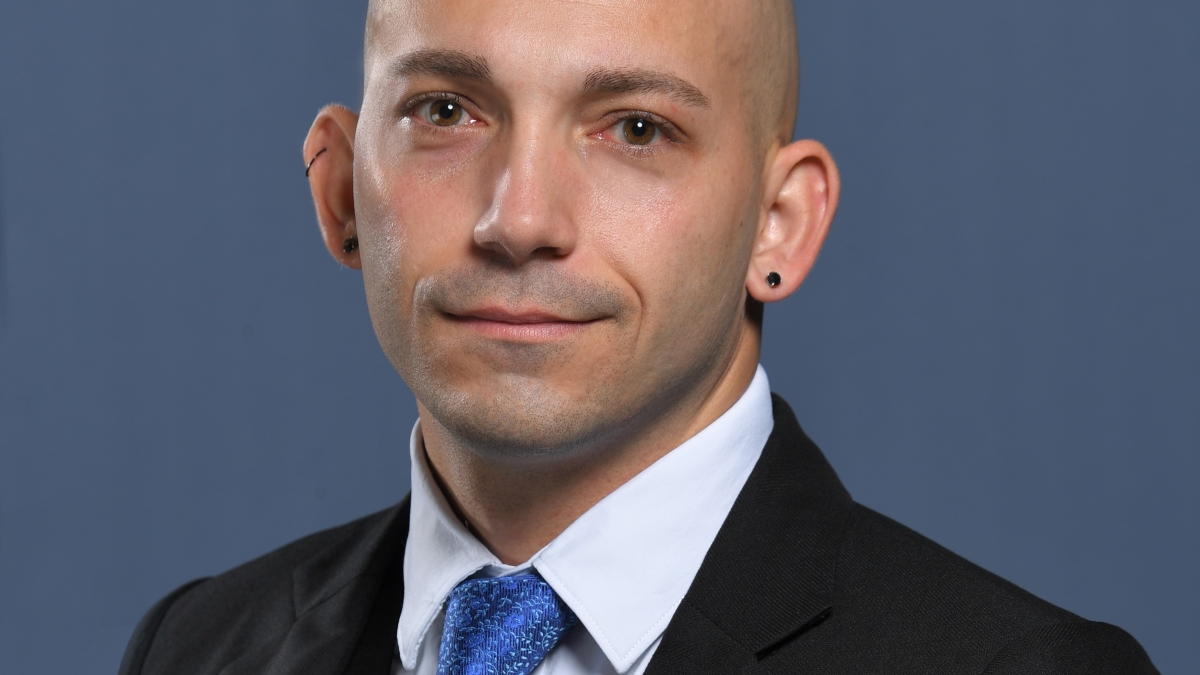ASU Law grad uses theater background to fuel new legal career

Zach Rufa is graduating with his Juris Doctor from the Sandra Day O'Connor College of Law at Arizona State University this fall after pivoting from a theater career. Courtesy photo
Editor’s note: This story is part of a series of profiles of notable fall 2023 graduates.
The practice of law and the practice of theater have one major thing in common: performance.
That’s according to Zach Rufa, who is graduating from the Sandra Day O’Connor College of Law this fall with his Juris Doctor. Before attending ASU Law, Rufa was a playwright and artist living and working in New York.
As an undergraduate at Brown University, he said he came to a fork in the road and had to choose between two passions: law and the arts. He chose the arts, but he knew the law would be there waiting for him in the future. When the pandemic hit, and theaters shut down, he embraced the opportunity to return to his passion for the law.
“Law had been a great passion of mine from a young age, alongside the arts,” Rufa said. “When the pandemic hit, the entire theater industry shut down, and it was then that I sort of looked around at where I was in my life and I looked at who I had become as an artist, and I knew that I had sufficiently established my artistic identity such that I would not lose that part of myself if I were to pursue the other fork in the road that I'd almost walked down years earlier.”
While at ASU Law, he thrived. He pursued two certificates alongside his JD: one in trial advocacy and one in law, science and technology with an emphasis in intellectual property. He also served as the inaugural student executive director of The McCarthy Institute, which is dedicated to IP law, gained critical hands-on experience at the First Amendment Clinic and externed at the Arizona Legal Center, assisting community members with legal needs. A Gary L. Birnbaum Memorial Scholarship recipient, he is graduating one semester early.
Additionally, Rufa took advantage of ASU Law’s location in Los Angeles and plans to stay in California after graduation. After taking the bar exam, he will join Knobbe Martens, a preeminent IP law firm, as an associate.
After three years of law school, Rufa doesn’t feel like he’s leaving the arts behind in favor of his new career.
“I think the process of becoming an attorney has made me a better artist, and I think I will be a better attorney because I am an artist,” he said.
Question: Why did you choose ASU?
Answer: The best decisions I've made in my life have been because, ultimately, I just had a good feeling about making that decision and I followed through on that feeling. And that's precisely why I chose ASU. I had a good feeling it was the right decision. There were a great many specific things about ASU Law that positively influenced my decision to choose ASU, such as its fantastic reputation and its Los Angeles program, but ultimately I think I chose ASU because of a positive but ineffable feeling I'd had that I would be happy here. I can't point to any one thing in particular that made me feel that way, though I think it was due in large part to a combination of the personalities of the people I encountered who were a part of the ASU Law community and my belief that I would find at ASU a place where I could flourish.
Q: What about advice for those considering ASU Law?
A: Do what's going to make you happy. I am not going to tell you not to spend hours pouring over news stories and blog posts and rankings, because I know so many law students — myself included — who did exactly that. But I would tell you to take a breath before you decide where to go to law school, and to ask yourself as you take that breath, "Is this decision going to make me happy?" However you think about your happiness, make sure to prioritize it. There is a lot about ASU Law that is very special, and it is a place where I think a lot of people could find themselves being happy. When I took that breath and asked myself whether choosing ASU would make me happy, I ultimately answered yes. I turned out to be correct.
Q: If someone gave you $40 million to solve one problem on our planet, what would you tackle?
A: I would put it toward improving access to higher education for people with disabilities. As someone who has gone through life with a congenital physical disability and who now uses a prosthetic limb, this is a cause that I care deeply about and that resonates with me on a profound personal level for obvious reasons.
Q: What does graduating mean to you and your loved ones?
A: This is the culmination of a journey that is a long time in the making and which has not always been easy, but which my loved ones have supported me throughout. I could not have done this without them.
Q: Who, if anyone, helped you get here?
A: So, so many people helped me get here. If I tried to list everyone by name, I fear it would resemble a run-on speech at the Oscars where the band has to start playing to get the person off the stage, but in general, I've gotten here through the help of a great many people, including family, friends and mentors. It is deeply important to me that I never lose sight of the fact that any success I've had in my life is due in great part to the kindness that people have shown me in helping me to achieve that success. It is also tremendously important to me, insomuch as it is ever within my power to help others in the ways that I have been helped, that I do so. In fact, I believe I have an obligation to pay forward the kindness that has been shown to me by helping others in turn.
More Law, journalism and politics

ASU Law to offer its JD part time and online, addressing critical legal shortages and public service
The Sandra Day O’Connor College of Law at Arizona State University, ranked 15th among the nation’s top public law schools,…

ASU launches nonpartisan Institute of Politics to inspire future public service leaders
Former Republican presidential nominee and Arizona native Barry Goldwater once wrote, "We have forgotten that a society…

Annual John P. Frank Memorial Lecture enters its 26th year
Dahlia Lithwick, an MSNBC analyst and senior legal correspondent at Slate, is the featured speaker at the School of…

